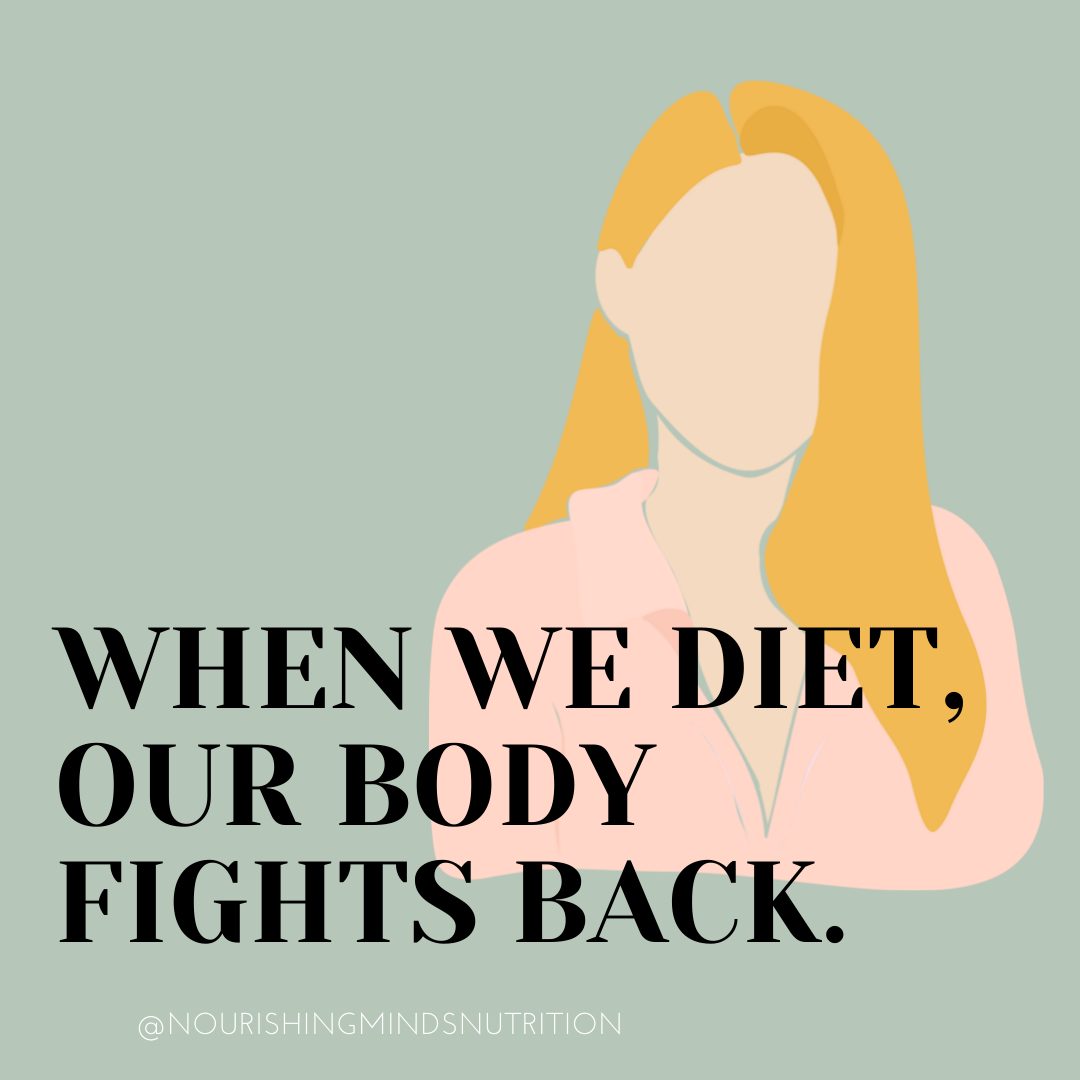How Much Fiber Is Too Much Fiber?
By: Megan Perez, dietitian at Nourishing Minds Nutrition
Who would have thought that fiber would be such a hot topic today? I am constantly hearing people talk about it! And no, it’s not just coming from the many wonderful dietitians I have in my life. While us RDs have always inquired about our client’s fiber intake, I remember a time when it was rarely brought up in conversation. Now, thanks to diets in disguise and society’s obsession with health, fiber is rapidly gaining in popularity. If you have been focusing on increasing the fiber in your diet, like most people have over the last few years, then this blog post is for you! But first, let’s learn more about fiber.
To start with the basics: What is fiber and where can you find it?
Fiber is a nutrient found in plants, which makes it a type of carbohydrate. Unlike other carbs, fiber cannot be broken down into sugars, and so it travels through the body undigested. Fiber comes in two types: soluble and insoluble.
Soluble fiber - Pulls water into the digestive system which creates bulk. This works like a sponge and helps us to feel fuller for longer. Foods like apples, oranges, beans, potatoes, and oats are high in this type of fiber.
Insoluble fiber - Speeds up digestion and helps move stool along, increasing regularity. Foods that are high in this type of fiber include whole wheat, wheat bran, cauliflower, corn, berries, and nuts.
Most whole foods contain both types of fiber. If you eat a variety of fruits, veggies, and whole grains, you will get both! A fiber rich diet is also associated with many health benefits. Some of these include:
Lower cholesterol
More stable blood sugars
Less constipation
Decreased risk of intestinal cancers
Improved heart health
So far, fiber sounds pretty great! I can definitely understand why more and more people focus on upping their fiber intake. I want to remind you though, that nutrition is not black and white. Just because fiber makes me healthy, it’s easy to assume that more fiber must make me REALLY healthy! This is not necessarily true. Even though the media suggests that most Americans are still under eating fiber, it does not mean that everyone is! In fact, I see more clients than ever who are eating an excessive amount. I have also found that many clients have developed fears around foods that do not contain fiber or that are low in this nutrient. While fiber is an important part of our diet, it is not the only important nutrient. Fiber intake is also not the only factor for good health.
How much fiber should I eat and how do I know if I’m eating too much?
The Academy of Nutrition and Dietetics recommends consuming about 25-35 grams of total fiber per day. This could look like 1 cup of grains, 2.5 cups of vegetables, and 2 cups of fruit per day, but the combinations are infinite (don’t forget peanut butter)! Some of my clients have been known to eat this much fiber in one meal! It’s no wonder then, why we see so many digestive issues in people who identify as “healthy eaters.”
In theory, adding more fiber (from both types) should improve our digestion, however we need to consider many factors when it comes to our regularity. Stress, water intake, physical activity, and gut function are some. People with inflammatory bowel diseases such as Crohn’s and Ulcerative colitis must be careful with their fiber intake. In these conditions, along with diverticulitis and IBS, fiber can exacerbate symptoms and make flare ups much, much worse. I have personally seen cases where years of excessive fiber intake has led to impaired gut function and even the need for surgical intervention.
Due to the high fiber craze, there has been an influx of fiber supplements and products which make it incredibly easy to surpass the daily recommendations. Don’t like whole grains or vegetables? We have a pill for that! EVERYONE can get the benefits of a high fiber diet with the purchase of “X”! We all know how clever and sneaky diet ads can be. Many of my clients are eating plenty of whole foods high in fiber plus fiber crackers/powders/bars. Do you think this could be what’s going on with you?
The most common symptoms associated with excessive fiber intake (especially if adding it in very quickly) are:
Bloating and abdominal pain
Increased gas and flatulence
Constipation
Stomach cramps
Diarrhea
Intestinal blockages
Fiber supplements (verses fiber found naturally in whole foods) may also cause digestive distress. Fiber bars and crackers will often contain inulin or chicory root in larger than normal amounts which can cause almost instant pain, bloating, or gas in certain people. People with digestive conditions are especially sensitive to these supplements.
If, after reading this article, you believe you may be over-consuming fiber, I recommend experimenting with a lower fiber diet. I understand this may be difficult for some. Start by limiting fiber products and supplements. Then, try subbing out half of your whole grains for white or refined grains (½ brown rice and ½ white rice or ½ whole wheat pasta with ½ regular pasta). Try this for a couple weeks and be mindful of any changes you experience. There are several other reasons for digestive issues, but I find this to be a huge factor and a great first step in identifying the root cause.
As you can see, there is not a “one size fits all” when it comes to fiber intake. A high fiber diet should not be recommended for everyone! I highly suggest working with a registered dietitian for an individualized plan for you. Also important to remember is that you do not have to follow a high fiber diet. Extreme behaviors are not sustainable behaviors. You can experience all the benefits of fiber from just a moderate amount in your diet.
This blog post is incredible Megan, thank you so much! You can learn more about Megan and the services she provides at Nourishing Minds Nutrition here.








